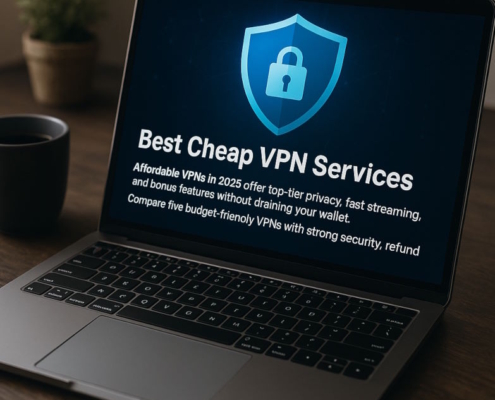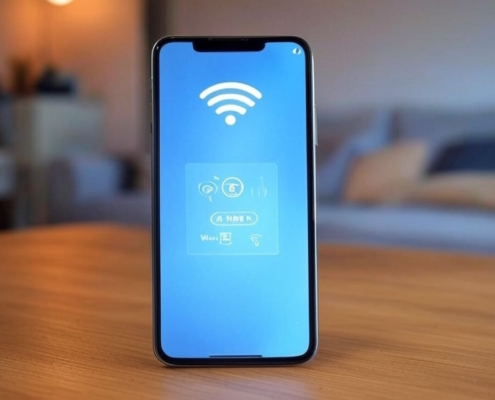Introduction
Your IP address is hidden via a virtual private network, which encrypts the connection to the internet and makes it appear to applications and websites that your online traffic is coming from a different place—such as a new city, state, or nation. VPNs are multifunctional tools that give you an additional layer of anonymity, enable you to access content that is geo-blocked, and get around your internet service provider’s throttling limitations.
More than ten years ago, I started using VPNs for video streaming, and ever since, I’ve found them useful for travel and for work. However, you must first learn how to utilize a VPN in order to make use of all of its many advantages. In this article, you will learn important aspects about VPN including ‘How to use a VPN?’
How to use a VPN?
Installing a VPN application and connecting to the server constitute the basic steps of using a virtual private network (VPN).
- You must first install a VPN program and log in using your account details.
- Next, decide which VPN server you want to use. Pick a server that is nearby to you in terms of location for the quickest speeds. Select a server in the nation of your choice, however, in order to see region-locked content, such as videos from an overseas Netflix collection.
- Next, activate your VPN by clicking the “Connect” option, which is often found after step three. Your VPN ought to be enabled now.
When is utilizing a VPN advisable?
Now you have broadly understood ‘How to use a VPN?’ let’s know the situations when using it is useful. VPNs are fantastic for travel, entertainment, and privacy, to name a few benefits.
- Privacy: When you use a VPN, your traffic seems to be coming from a different city, state, or even nation to applications, websites, and ISPs rather than from your IP address, which indicates where you are physically present. Because encryption protects against man-in-the-middle assaults, VPNs may restrict targeted marketing.
- Travel: If you are traveling abroad, you may be able to skip CAPTCHAs, which ask you to confirm that you are the person connecting to the email account you use.
- Streaming: To unlock foreign content libraries, you can employ a VPN to pretend to be in a different country and trick streaming sites like Netflix into believing you are there. When you travel, you can use a VPN to continue watching videos that are available on streaming services back home.
- Gaming: Using a VPN can reduce latency or stop DDoS attacks. Nevertheless, as all VPNs significantly slow down internet connections, using one could impair your gaming experience.
VPN services that we suggest
As an outstanding VPN overall, ExpressVPN is our Editors’ Choice. It has cutting-edge capabilities, unrivaled privacy, and an intuitive design.
Having evaluated VPNs for gaming and streaming, NordVPN is the fastest one we found, with an industry-best 11% average reduction in internet download speeds.
With its massive server network, user-friendly interface, and lightning-fast internet speeds, Surfshark is an amazing VPN service that is affordable and does not break the bank.
We exclusively suggest Proton as the finest free VPN available. With its free plan, there are no advertisements on your screen or data collection and sale. Proton’s premium package, however, is well worth the investment because of its wide network of servers and excellent geo-unblocking for viewing.
Connecting to various platforms via a VPN
Although utilizing a VPN is generally straightforward, how you do it differs according to the gadget or devices you’re using. This article will discuss how to install a VPN on different operating systems, such as MacOS, Windows Android, and iPad or iPhone.
VPN Usage on Windows
- Download the executable (.exe) Windows installation from your VPN provider’s website. It is possible to download certain VPN services straight from the Windows software store, such as Hotspot Shield.
- Open the folder (usually your downloads folder) containing the VPN installer. You may install your VPN by double-clicking the exe file & following the prompts.
- Switch on your virtual private network (VPN), enter your login details, and establish a server connection.
VPN Usage on MacOS
- Download the macOS installer (it should be a pkg file or a package) from the website of your VPN provider. As an alternative, you can look for your VPN service provider in the Apple program Store, such as NordVPN, and then click on Get to download & set up the MacOS program.
- Locate the pkg file in the location where it was saved, which is probably your downloads folder. To install the software, double-click it and adhere to the installation instructions.
- Select your desired server, log in to your account, & start your VPN.
VPN Usage on Android & Android TV
Android phones, tablets, and TV boxes (like the NVIDIA Shield TV and Chromecast with Google TV) may all be used to download VPN apps through the Google Play Store.
- Go to the Play Store.
- Find the VPN service provider.
- Hit the install button.
- Launch the app, log in, choose a server, and take benefit of your secure connection.
How to use a VPN on iOS & iPadOS?
On iOS or iPadOS, configuring a VPN is simple:
- Launch the App Store.
- Look for the VPN service you use.
- Select “get” by tapping the name of the app provider.
- Launch the app, choose a server, and log in.
VPN Usage on Fire TV
Unblocking foreign Netflix libraries is made simple by using a VPN on the Amazon Fire TV streaming device.
- Select Find.
- Click on Search.
- Enter the name of your VPN service provider and select the appropriate option.
- Click “Get.”
- Launch the app, log in, then select a server.
VPN Usage on Apple TV
The native VPN capability offered by Apple TV streaming boxes with TVOS 17 makes TV streaming easy.
- Go to the App Store.
- Find the VPN service provider.
- Click on Get by tapping the name of the app supplier.
- Launch the program, log in, then choose a server.
Making use of a VPN extension for browsers
Although a VPN application is simple to install for privacy all over your device, you can instantly increase your privacy with browser extensions. However, most VPN browser extensions from companies like NordVPN and Surfshark solely encrypt communication within that particular online browser, such as Firefox or Chrome. However, there are other businesses that provide browser plug-ins that function on your whole device, such as DuckDuckGo. Check the add-ons for your web browser, install the VPN software, log in, and select a server.
VPN usage on Linux
Although most platforms have very simple VPN installations, Linux has a slightly more involved process.
Linux applications can be downloaded from some VPN providers—typically .deb files, which are packages of software installers for Linux operating systems based on the Debian Linux distribution (such as Ubuntu), or run scripts (shell scripts). Here’s how to utilize downloaded installers to connect to a VPN on Linux:
- Download your Linux installer from the VPN provider’s site.
- Launch a terminal window (CTRL + ALT + T is how most Debian OSes do this).
- To access the folder containing your downloaded installation, execute the change directories (cd) command. Usually, this is: cd/home/[username]/Downloads
- Start the installation process. For a .deb file, the correct command is sudo apt install [package name]. To enable file execution for a.sh file, use the following command: chmod +x [file name],
- Next, execute the installation by using sudo./[file name].
- Click the VPN icon, log in, and select a server.
Command line installations are used by several VPN companies, such as ExpressVPN, NordVPN, and Surfshark:
- On the majority of Debian Linux distributions, press CTRL + ALT + T to launch a terminal window.
- Copy the installation command (CTRL + C) and paste it into the terminal (CTRL + SHIFT + V) using the website of your VPN provider.
- To begin the installation procedure and adhere to the instructions, press Enter or Return.
- Open the Linux Virtual Private Network application, log in, and select a server.
How should you configure your VPN?
You must utilize the proper settings after installing your VPN. These are the primary configuration options that can be adjusted.
Server Location
A rapid connect option is often present, which allows you to pass through the quickest server or one that is located nearby. This is an excellent alternative if all you want is privacy immediately. However, if you have needs specific to a certain region, such as wanting to stream content from BBC iPlayer from the United Kingdom or continuing to binge-watch White Lotus on Max when away from the US, choose a server in your desired nation.
VPN Protocol
How your device interacts with the VPN server is determined by the VPN protocol. The highest speeds with reliable security are often provided by WireGuard. Despite having less speed than WireGuard, OpenVPN provides the highest level of security owing to its proven track record. As with using a VPN on a smartphone or tablet, IKEv2 functions well while hopping between WiFi networks and mobile data.
A lot of VPN service providers use exclusive protocols. As an illustration, ExpressVPN’s LightWay protocol promises lightning-fast internet download rates and post-quantum protection against a range of security risks, including attacks known as man-in-the-middle, which have the ability to intercept private information like passwords. Double NAT is used by NordVPN’s WireGuard-based NordLynx to provide a secure connection without storing IP addresses.
The most effective VPN protocol to utilize for most people who want the strongest possible internet connection is WireGuard. Its ChaCha20 encryption is practically equivalent to OpenVPN’s AES 256-bit cryptography. People with serious privacy demands should give OpenVPN serious consideration, as it is a more established and secure protocol, even though its bigger and less effective codebase contributes to its slightly slower speeds.
Split tunneling
You may establish a VPN connection on your gadget for certain applications but not for others by using split tunneling. For example, to access foreign streaming material on your phone via the Disney Plus application, you utilize a VPN, but not your smartphone’s banking app, thus you skip the security CAPTCHA. In order to prevent my internet bandwidth from crashing, I frequently use split tunneling for my gaming computer to stream foreign Netflix libraries while downloading big video game downloads via the Steam games client.
Specialty Servers
- Obfuscated servers: These servers, which are available with certain VPNs, make it harder for websites, apps, and internet provider companies to figure out that you’re running a VPN. An obfuscated server might resolve issues with misbehaving apps or websites, such as preventing logins.
- Tor Over VPN: To provide further encryption, Onion Over VPN servers leverage The Onion Router or Tor. People who have severe privacy concerns, such as political activists and asylum seekers, might find these servers’ enhanced privacy beneficial.
- Double VPN: Two VPN connections are used by a multi-hop / double-hop VPN server to provide twice the encryption. While they employ different techniques, double VPNs provide privacy protection on par with Tor VPN servers.
- Peer-to-peer, or P2P, servers: Some VPN companies have specialized P2P servers, while numerous VPN services permit file sharing on every server. Using BitTorrent or similar file-sharing applications, you should choose a P2P server if you are downloading things such as Linux ISOs and public domain movies.
Connecting to a VPN on several devices
Installing a VPN program on each device—think of it as downloading an application for your MacBook Pro, Apple TV, and iPhone—is the simplest method to use a VPN across many devices. There’s usually a limit on the number of concurrent connections, but the majority of VPN companies allow you to install VPN programs on as many different devices as you like. You could install NordVPN on thirty or more devices, for example, but just have a VPN open on ten of them. However, a few companies, like as PIA, IPVanish, and Surfshark, enable an unlimited number of simultaneous connections.
If you want coverage across the entirety of your home, you can also set up a VPN over your router. All devices linked to your router will, therefore, establish an encrypted connection. A virtual private network (VPN) can be used with gaming consoles including the PlayStation 5, Xbox Series X, and Nintendo Switch, as well as streaming boxes like the Roku, by setting up a VPN on your router. Intuitive routers having VPNs pre-installed include ExpressVPN’s Aircove & Aircove Go.
Frequently Asked Questions on How to Use a VPN
- How to use a VPN?
To use a VPN, all you have to do is install the software on your device, run it, log in with your account, and choose a server. Selecting a VPN server in your target nation will allow you to view region-specific content, although, for the fastest connections, you should generally go for a server that is physically close by.
- Is it legal to use a VPN?
Most nations allow the use of VPNs, but you should confirm with your local government to be sure.
- How do virtual private networks operate?
Your web traffic is first routed through an encrypted server by a VPN before reaching applications, websites, or ISPs. The internet services that you use see your traffic as originating from an IP address that is different from your IP addresses; you can make it appear as though you are in another city, state, or nation.






























